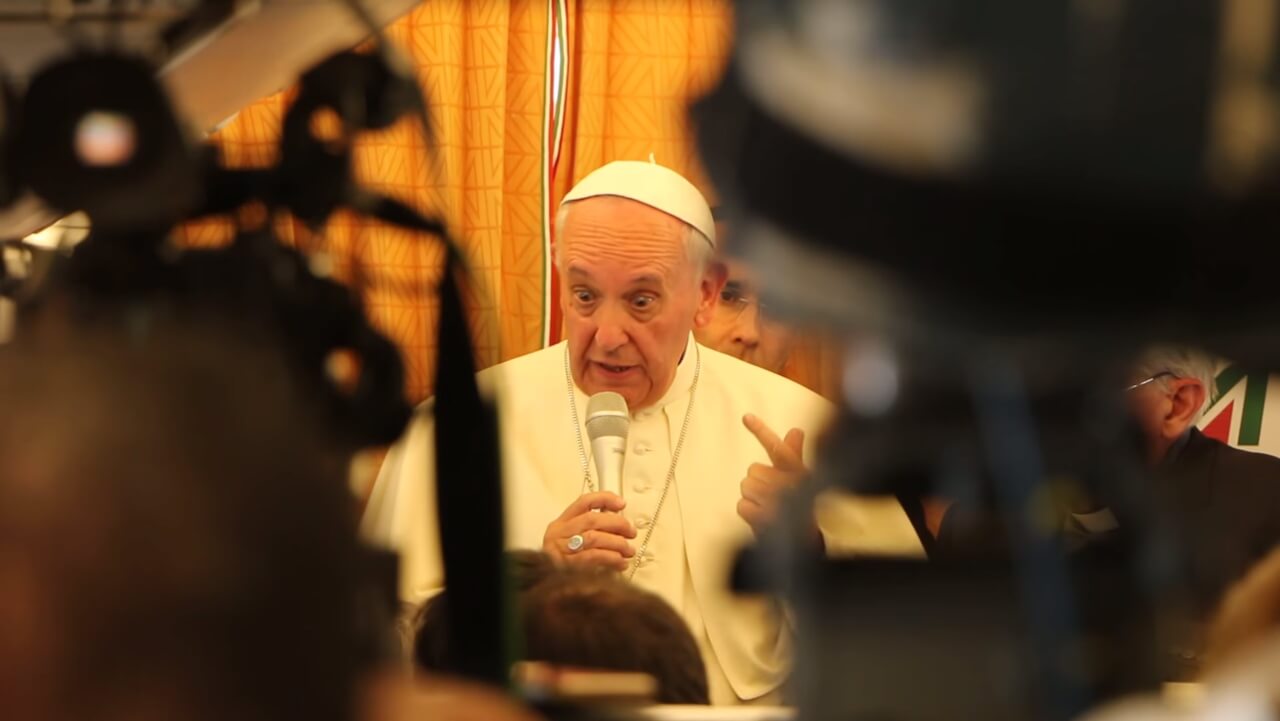A question was asked of the Pope, during the in-flight press conference returning from World Youth Day in Panama, about youth: “[There are] many young people who are fallen away from the Church or who have difficulties. In your opinion, where do young people find these difficulties, what are the reasons that drive them away from the Church?”
The Pope replied:
“There are so many reasons! Some are personal, but more are general. I believe that first of all it is the lack of witness from Christians, from priests, from bishops. I won’t say the witness of the popes because that would be too much… but it is also that! The lack of witness!
“If a pastor is an entrepreneur or merely the organizer of a pastoral plan, or if a pastor is not close to the people, this pastor does not give true witness. The pastor must be with the people, he must go ahead of the flock to find the way, he must be in the midst of the flock to experience the smell of the sheep and understand what the people feel and what they need, how they feel, and he must go behind the flock to keep the rearguard. But if a shepherd does not live with passion, people feel abandoned, orphaned.
“Apart from pastors there are also Christians and Catholics who are hypocrites, who go to Mass every Sunday and then don’t pay their workers a Christmas bonus, they pay underhandedly, they exploit people, then they go to the Caribbean on vacation, ‘But I am Catholic, I go to Mass every Sunday.’ If you do this, you give a counter-witness [against the Gospel]. And this is why more and more people are alienated from the Church. I would say, don’t say that you are a Catholic, if you don’t give witness. Say instead, ‘I had a Catholic education but I am lukewarm, I am worldly, don’t look at me as a model.’
“I am afraid of Catholics like that, eh? Who believe they are perfect! But history repeats itself: Jesus was like that with the teachers of the law, wasn’t he? ‘I thank you Lord because I am not like this this man…poor sinner…’ This is the lack of witness.”
—-
These words of the Pontiff about the abandonment of the Church certainly contain some truth: the need for witness, the need for the closeness of pastors, at every level, to the people, and the problem of the hypocrisy of Catholics (But could he possibly have missed something? Concerning those who go to Mass, well obviously … but not a word about those who say they are Catholic and yet promote abortion up until the ninth month of pregnancy).
But apart from these, I would also add something else.
Last August 26, the testimony of Archbishop Viganò was made public, which openly and directly called the Pope into question. He asked for the reason for the Pope’s behavior, that is, why he had favored a serial-abuser-cardinal, Theodore McCarrick, and had freed him from the restrictions imposed on him by Pope Benedict XVI, using him as his envoy to different parts of the world and as his counselor in the management of the Church in the United States. It is a fact that Francis promoted people linked to McCarrick and his group, a fact which is still happening even now.
The Pope did not reply. Also, he said that he would not say one word about it. This silence, this refusal to speak – refusing to say “it is true,” or “it is not true;” or to say “I was mistaken,” or “I did not understand” – this refusal is a serious blow to his credibility. And many people think so, both Catholic and non-Catholic. How much damage is caused by a Pastor – both to himself and to the Church – when he does not respond, does not offer clarity, and relies on making personal attacks and put-downs in order to avoid giving answers? How much do people lose faith in him?
The complicity of the mass media is not enough to save him. In the press conference returning from Panama, not one question was made about the McCarrick cover-up. Nobody had the courage to say, “Your Holiness, on August 26 you told us to read what Archbishop Viganò wrote and to draw our own conclusions. We read it. But what do you have to say about it? Is it true, or is Archbishop Viganò lying?” And similarly, not even one question was asked about the fact that a certain Argentine bishop [Gustavo Zanchetta] was given refuge in the Vatican – and an important position was created just for him – despite the fact that multiple testimonies indicate that the Vatican had been informed about his, shall we say, little defects in his behavior with seminarians.
But in this, as in other cases, the highest authority of the Church is lacking a quality which people value perhaps more than any other in one who asks for trust, in one who preaches, in one who ought to exercise moral authority: he lacks clarity. Instead, unfortunately, there is the impression once again of “cut off and soothe…soothe and cut off.” He cuts off questions, at times dramatically, at times embarrassingly, with silence, trusting that people will forget about them. But this does not create either faith or attraction. It does not warm anyone’s heart, nor does it lead anyone to say, “I trust him.”
Originally published at MarcoTosatti.com. Translated by Giuseppe Pellegrino.


